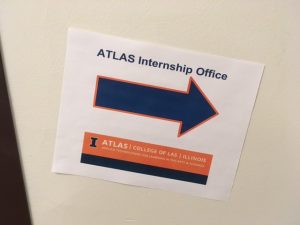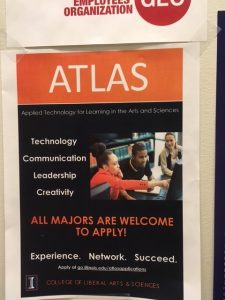 A degree in English or Creative Writing means flexibility, good communications skills, and, therefore, the ability to excel in many career paths. While these majors offer many options for post-grad life, adding a minor or certificate program that interests you could expand your options even farther
A degree in English or Creative Writing means flexibility, good communications skills, and, therefore, the ability to excel in many career paths. While these majors offer many options for post-grad life, adding a minor or certificate program that interests you could expand your options even farther
The English department recently invited multiple faculty members from departments across campus to speak about the minor and certificate programs they offer and how these could pair well with a degree in English or Creative Writing. Find the programs, their contacts, and their websites for more information, detailed below.
Informatics Minor, Department of Informatics
As described on their website, “Informatics studies the design, application, use, and impact of information technology.”
The minor consists of 6 classes, which includes 3 core classes and 3 upper-level electives, which can be chosen from 160 options.
There are also specific tracks that students can decide to follow, if they so choose, but this is not required. Some of the popular tracks are Business, Geography Information Systems, Web Design, and Bio Informatics.
With the 373 minors, Informatics the third largest minor on campus.
At the event, Prof. Karin Readel, Senior Coordinator for Informatics Education Programs, said that the minor is, “a way to stand out from the crowd no matter what your major is” and that this minor in particular is “highly customizable.”
You can schedule an appointment with an advisor here or you can reach out to Prof. Readel at this email: kereadel@illinois.edu.
Bio-Humanities Certificate, Illinois Program for Research in the Humanities
Prof. Antoinette Burton, director of Illinois Program for Research in the Humanities, called this certificate a “combination of life sciences and humanistic approaches” and “the new frontier of cross-discipline studies,” so it is perfect if you’re an English department student who is also interested in seeing how what you’re learning in our department also connects to other topics in the STEM field. As certificate’s webpage says, “These courses will give students the opportunity to develop interdisciplinary thinking about the ways in which science, culture, and politics shape one another.”
This certificate is also flexible—it only requires 12 hours and has no required courses. Instead, students pick from a list of approved courses to tailor their experience to their specific interests.
If you’re wanting to learn more, you can email Prof. Burton at aburton@illinois.edu or read the webpage about the certificate.
Criminology, Law, & Society Minor and Certificate, Department of Sociology
This field of study actually offers both a minor and a certificate. The minor requires 18 hours of courses, while the certificate requires 12. There are 3 required courses and the rest of the courses can be chosen from a list of pre-approved courses.
Prof. Jane VanHeuvelen, a lecturer in the Department of Sociology, said that this course of study focuses on the theoretical and practical issues regarding law and crime in society. She also emphasized that these courses use social science research methods to look at ideas such as using numbers to answer questions we may have about society.
Both Prof. VanHeuvelen and the minor’s webpage noted that this minor can be used as a foundation for law school, but is definitely open for students who do not intend to pursue law school.
If you are looking for more information, you can visit the minor’s webpage or email Prof. VanHeuvelen at jvh@illinois.edu.
Minor in Global Markets and Society, Center for Global Studies
This minor is newer than some of the others—it is currently in its second year and has almost 100 students in its program.
Prof. Timothy Wedig, Associate Director of the Center for Global Studies, said that students in the English department “should see [themselves] as a collection of really really marketable skills” and that this minor helps amplify those skills. He also emphasized students “don’t need business courses to be successful in business.”
Instead, you can use this minor to focus on critical thinking, analysis, and communication skills that will help you be successful in the business world.
This minor requires 18 hours of courses, 6 of which need to be at an advanced level (300 or 400 level). After these 18 hours, students pick a specialization track, which requires 9 more hours of coursework. The specialization track options include: Global Markets and Governance; Science, Technology, and Markets; and Analytical Approaches and Languages, among others.
At the end of this coursework, students then have an option to complete a capstone project through an internship, research with a faculty member, or an analytical or research paper written under faculty guidance.
For more information, visit the minor’s webpage or email Prof. Wedig at twedig@illinois.edu or email the global studies office at globalstudies@illinois.edu.
Minor in Leadership Studies, College of ACES
Prof. Lisa Burgoon, who is the director of the minor and teaches the introductory course, said that this minor is helpful in any career field, which makes sense because most people will find themselves in a leadership role at some point in their career, and being an effective leader can make a huge impact on companies and organization’s overall performance and success.
This minor requires 17-18 hours of coursework, including 9 foundational hours from required courses, 5-6 hours of elective courses, and a 3 hour, upper-level capstone course.
This minor currently has about 275 students.
There are 26 electives to choose from and Lisa Burgoon listed these as possibly being of particular interest for English majors: AGCM 430, Communication in Environmental Social Movements; AGED 230, Leadership Communications; CMN 321, Strategies of Persuasion; JOUR 250, Journalism Ethics and Diversity; and SE 361 Emotional Intelligence Skills.
There is also a service component to the capstone course, where students are asked to pitch ideas on how to solve a community problem and then form teams to follow through on their plans. The world flags that fill the SDRP’s main, entry-level area are a result of one group’s effort to make the space more inclusive. You can read more about their efforts and their partnership with University Housing here.
For more information, visit the minor’s webpage or email Prof. Burgoon at burgoon@illinois.edu.
Geographic Information Systems Certificate and Minor, Department of Geography
This certificate program is in its first year. The certificate and minor focus on geohumanities, which considers how place matters to humans, and how to use technology to visualize humanities, both through text and through visuals, to tell a story.
The certificate requires 4 courses, with two required courses and two additional that can be chosen from a list of electives.
The minor can be built on the certificate if a student pursuing the certificate finds they want to further study in the field. To earn the minor, a student must complete 18 hours of coursework, choosing classes from specific subsets of the field. These choices allow for flexibility so that the student can tailor the program to their specific interests.
Prof. Julie Cidell, who has taught some of the required courses, talked about one project that focused on mapping written works and authors so that interested users can use the map to search either by location, seeing where written works were published or written, or by author, looking at how their location of where they wrote their texts and where the texts takes place changes over time.
For more information, visit the minor’s webpage or the certificate’s webpage, email an advisor at ggis-advisor@illinois.edu, or email Prof. Cidell at jcidell@illinois.edu.
Sales Certificate, College of Media
Prof. Dionne Clifton, who lectures in advertising through College of Media, described this certificate as a “bridge to your professional life.” She said that the courses in this program read a lot of case studies that detail real world problems that businesses face so that students can discuss how to effectively solve them.
The certificate requires 5 courses, which can be taken in any order and have no pre-requisites. Below is a list and short descriptions of the required courses.
- MDIA 270—Introduction to Media Sales, focuses on theory and marketing
- MDIA 320—Sales Management, online & 8 weeks long, focuses on theory and problem-solving
- MDIA 370—Advanced Media Sales, online & 8 weeks long, asks how consumers derive value from products
- BTW 271—Persuasive Writing, focusing on principles of persuasion
- ADV 490—Internship Capstone, focusing on applied learning experience
For more information, visit the minor’s webpage or contact Prof. Clifton at dclifton@illinois.edu.
by Hannah Downing, Media Communications Intern, Department of English


 Recently we had the chance to talk to some staff and interns of ATLAS about internships. The conversation provided us with valuable information about
Recently we had the chance to talk to some staff and interns of ATLAS about internships. The conversation provided us with valuable information about